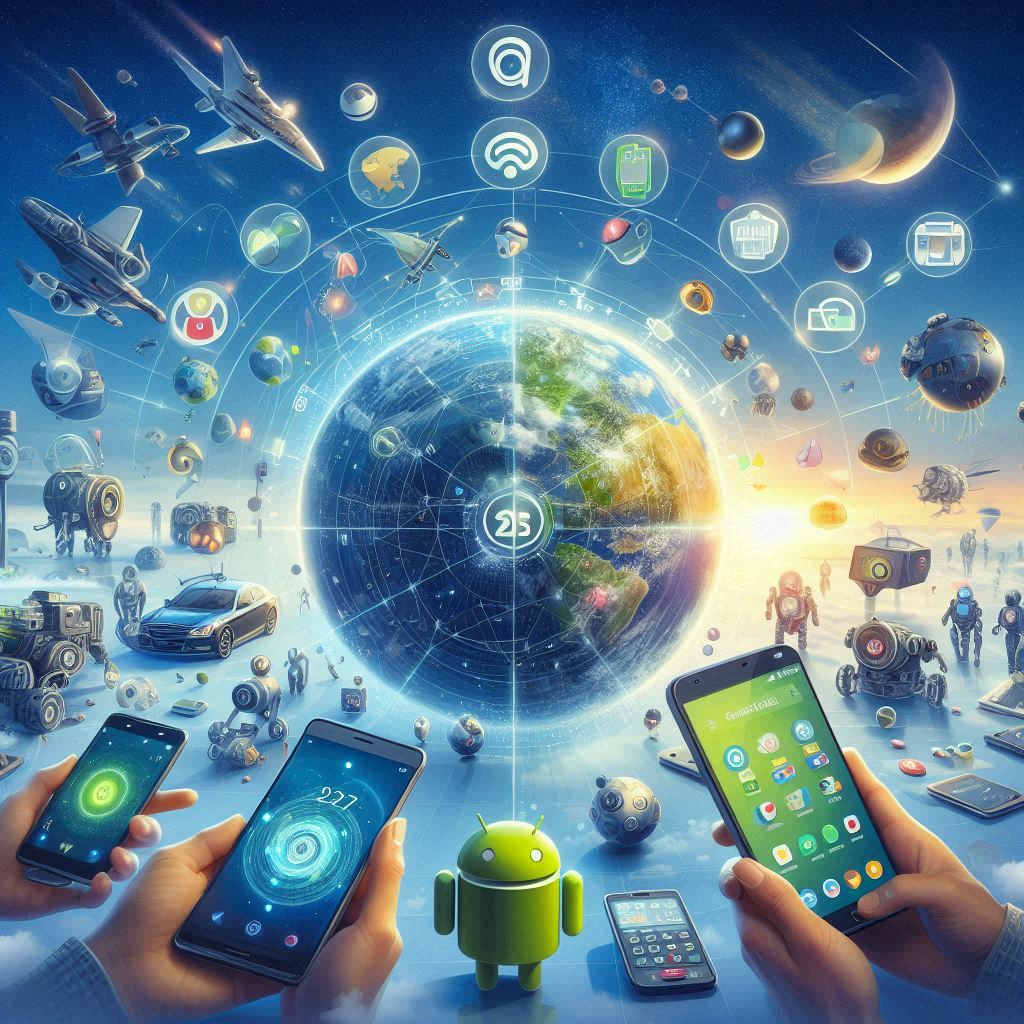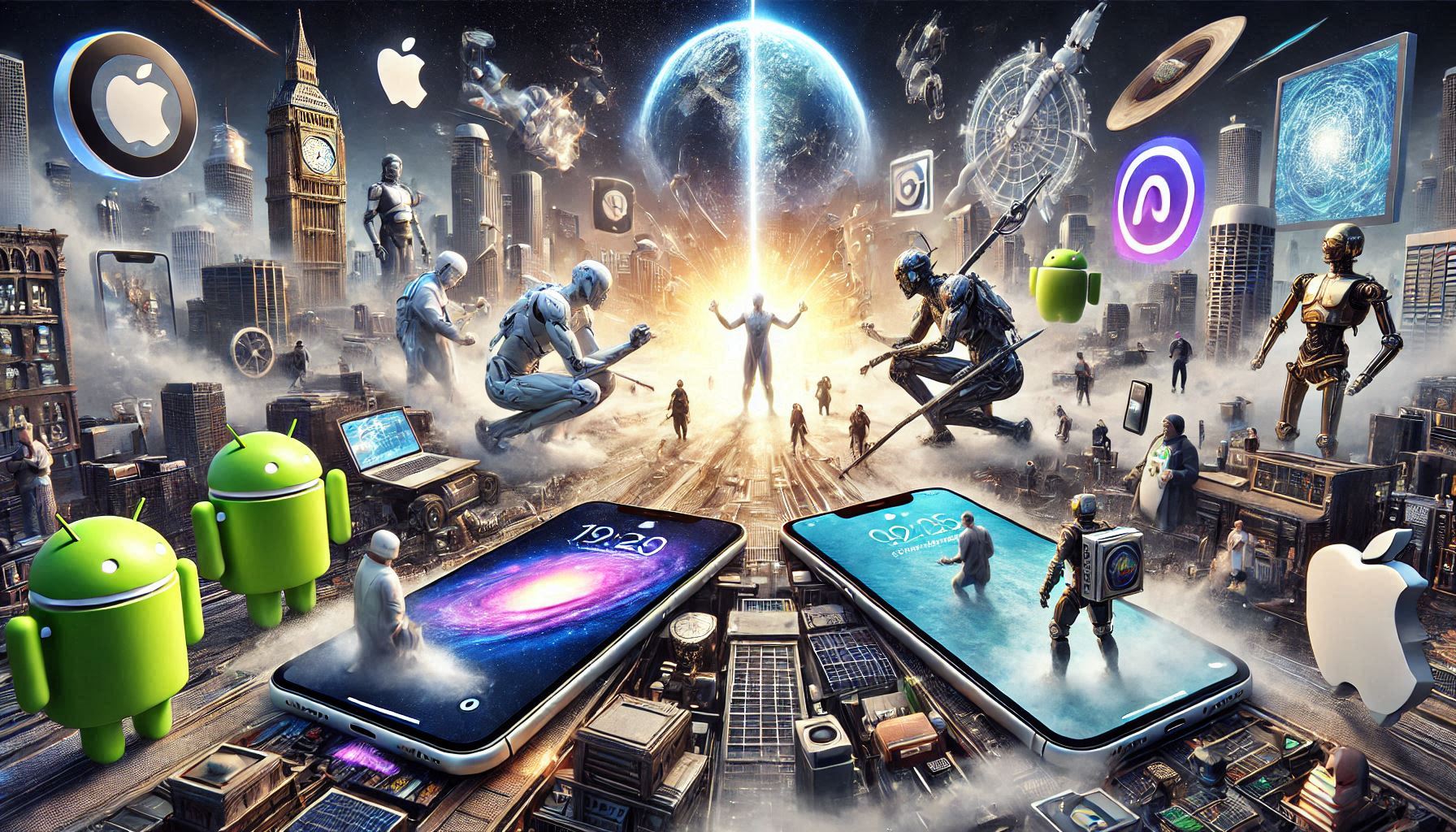Android vs iOS: The Future of Mobile Operating Systems: Android vs iOS in 2025 – Best 2025
The Future of Mobile Operating Systems: Android vs iOS in 2025
Introduction
The Future of Mobile Operating Systems: Android vs iOS in 2025: in the fast-paced world of mobile technology, the battle between Android vs iOS has always been at the forefront. Both operating systems have grown exponentially over the years, each bringing unique features and user experiences to their respective platforms. As we move toward 2025, mobile operating systems are expected to evolve at a rapid pace, with new updates, features, and improvements that will drastically reshape the mobile industry.
The competition between Android and iOS is fierce, and the stakes have never been higher. The anticipated advancements for Android in 2025 and the innovations in iOS will likely lead to major changes in how users interact with their devices. This article will explore the future of mobile operating systems, comparing the expected features, software updates, and overall user experience of both Android and iOS as we approach 2025. We will also examine the strengths and weaknesses of each operating system, offering a comprehensive comparison of what users can expect from their next device.
Key Opinion
As both Android and iOS continue to evolve, it is clear that the competition between the two will lead to significant innovations and improvements. With mobile OS market share constantly shifting and both platforms introducing new features, Android and iOS are striving to meet the increasing demands of consumers. In 2025, we can expect that software updates will be faster, more intuitive, and packed with features designed to improve user experience and mobile functionality.
Android vs iOS: A Historical Perspective
Before diving into the expected developments for 2025, it’s important to understand the historical context of both mobile operating systems. Android and iOS have had a long-standing rivalry, each bringing a unique approach to mobile computing.
Android, developed by Google, has been the dominant mobile operating system worldwide. Known for its open-source nature, customizability, and the wide variety of devices it supports, Android appeals to a broad range of users.
On the other hand, iOS, developed by Apple, offers a more controlled environment, with an emphasis on seamless integration between hardware and software, resulting in a polished, stable user experience. In terms of market share, Android continues to lead, but iOS remains incredibly popular in certain regions, particularly among high-end users and within the Apple ecosystem.

Android vs iOS: Mobile OS 2025 Predictions
Looking ahead to 2025, we can expect both Android and iOS to introduce new features and updates designed to further improve the user experience. Let’s take a closer look at what each operating system has in store for the future.
Android in 2025: New Features and Software Updates
The Android operating system is known for its flexibility, allowing users to personalize their devices in ways that iOS cannot match. By 2025, Android is expected to further expand its customizability options, allowing users to fine-tune every aspect of their device, from the home screen layout to the way apps function.
- Advanced Artificial Intelligence (AI) Integration
Android has always been at the forefront of incorporating new technologies, and AI will be a major focus in 2025. With Google’s AI-driven ecosystem, users can expect smart assistants that are more intelligent and capable than ever before. Android devices will leverage machine learning and predictive analytics to anticipate user needs and streamline their experience. AI will also be used for battery optimization, app management, and enhanced security. - 5G and Beyond
By 2025, the global rollout of 5G technology will be complete, and Android devices will be among the first to fully integrate 5G capabilities. The increased internet speed will lead to faster app performance, improved streaming quality, and better connectivity for IoT (Internet of Things) devices. Android will likely lead the way in introducing advanced 5G features, such as low-latency gaming and seamless video conferencing. - Improved Device Compatibility
One of the key strengths of Android is its ability to run on a wide range of devices. In 2025, this will only expand, with Android devices coming in even more shapes and sizes. Expect foldable smartphones, wearables, smart glasses, and other IoT-connected devices to be powered by Android, offering users a fully integrated experience across all their tech. - Enhanced Privacy and Security
As privacy concerns continue to grow, Android will likely strengthen its security features. Expect biometric authentication methods to become more advanced, with facial recognition, fingerprint scanning, and eye-tracking technology playing key roles. Android is also expected to adopt more robust privacy features, including better data encryption and permission management. - Customization and Personalization
In 2025, Android users will likely have even more control over the look and feel of their devices. New features will allow users to customize the user interface (UI), create unique themes, and even change core elements of their Android OS without affecting performance. Expect advanced widgets, home screen management, and greater flexibility with third-party apps.
iOS in 2025: New Features and Software Updates
While Android is known for its customizability, iOS has traditionally focused on providing a more uniform and polished user experience. By 2025, iOS will continue this approach, while introducing new features designed to improve usability and integrate with the wider Apple ecosystem.
- Seamless Integration with Apple Devices
One of the standout features of iOS is its integration with other Apple products, such as the Mac, iPad, and Apple Watch. In 2025, this ecosystem will become even more cohesive, with iOS devices acting as central hubs that seamlessly sync with each other. Expect unified apps across devices, cross-platform capabilities, and continuity features that allow users to switch effortlessly between Apple products. - Focus on Augmented Reality (AR)
Apple has been investing heavily in AR technology, and by 2025, it is expected that iOS will have fully integrated AR capabilities. With ARKit, Apple’s augmented reality platform, iOS will allow users to experience immersive AR apps that can interact with the real world. Expect iOS devices to become powerful AR hubs, enhancing gaming, shopping, education, and much more. - Sustainability and Energy Efficiency
Apple has placed a strong emphasis on sustainability, and iOS 2025 will continue this trend. Expect iOS to offer energy-efficient modes, enhanced battery life, and features that help users reduce their environmental footprint. These improvements will work in conjunction with Apple’s commitment to using 100% recycled materials in its devices. - Enhanced Privacy Features
iOS has always been strong on privacy, and by 2025, it will likely have even more stringent privacy protections. Apple is expected to introduce user-centric privacy tools, such as better app tracking transparency, more granular data permissions, and full encryption across all apps. Users will have greater control over their personal data, ensuring that privacy is maintained at all times. - AI and Machine Learning Enhancements
Siri, Apple’s virtual assistant, will continue to evolve with AI and machine learning advancements. By 2025, expect Siri to be more responsive and capable of handling more complex queries, as well as anticipating user needs. Apple’s AI will also be integrated into other aspects of iOS, such as smart home control, personalized recommendations, and more.
Strengths and Weaknesses: Android vs iOS in 2025
Both Android and iOS have their strengths and weaknesses. Understanding these can help users make an informed decision when choosing between the two platforms in 2025.
- Android Strengths:
- Customization: Android allows for greater customization of the user interface, home screen, and even system behavior.
- Variety of Devices: Android supports a wide range of devices, offering budget-friendly to premium options.
- Google Services: Android integrates seamlessly with Google’s services and AI, making it the preferred choice for users who rely heavily on Google products.
- Flexibility: Android offers a more open ecosystem, allowing for third-party apps and custom ROMs.
- Android Weaknesses:
- Fragmentation: The sheer number of Android devices can lead to issues with software updates and app compatibility.
- Bloatware: Some Android devices come with pre-installed apps that cannot be removed, which can slow down the system.
- iOS Strengths:
- Seamless Integration: The integration between iOS and other Apple devices offers a unique and polished user experience.
- Security and Privacy: iOS is known for its strict privacy policies and security features, including encryption and app tracking transparency.
- App Quality: iOS tends to have better-quality apps, as developers prioritize it due to its premium user base.
- iOS Weaknesses:
- Less Customization: iOS offers limited customization options, which may not appeal to users who want more control over their devices.
- Price: iOS devices are generally more expensive, which can be a barrier for some consumers.
Conclusion
As we move closer to 2025, the competition between Android and iOS will continue to evolve, pushing both operating systems to innovate and improve. Whether you prefer Android’s customizability or iOS’s seamless integration, there’s no doubt that 2025 mobile OS advancements will make smartphones smarter, more intuitive, and more powerful than ever before. The future of mobile operating systems is bright, and both Android and iOS are sure to introduce exciting new features and improvements that will shape the way we use mobile technology.
Trending and Viral Keywords
- Android vs iOS 2025 predictions
- Android vs iOS battle 2025
- Future of mobile operating systems 2025
- Top Android features 2025
- iOS 2025 innovations
- Best mobile OS 2025
- Android vs iOS speed test 2025
- Mobile OS comparison Android vs iOS 2025
- Next-gen Android features 2025
- iOS updates 2025 release date
- Android vs iOS user experience 2025
- Mobile operating system trends 2025
- What’s new in Android and iOS 2025
- Android features vs iOS features 2025
- Is Android better than iOS in 2025
- Mobile OS market share 2025 Android vs iOS
- Will iOS beat Android in 2025
- Android updates vs iOS updates 2025
- Which mobile OS is best for 2025 Android vs iOS
- Best Android and iOS features to expect in 2025
Long-Tail Keywords
- Android vs iOS 2025 comparison
- Best mobile operating system for 2025
- Upcoming Android features for 2025
- iOS updates and new features 2025
- Future of Android mobile OS in 2025
- iOS vs Android software updates 2025
- Innovative features in Android and iOS for 2025
- Mobile operating system advancements in 2025
- Pros and cons of Android vs iOS in 2025
- User experience differences between Android and iOS 2025
- What’s new in Android and iOS operating systems in 2025
- Android OS vs iOS: Which is better for 2025
- Features expected in Android vs iOS in the coming years
- Mobile operating system updates for Android and iOS in 2025
- Key Android improvements and iOS updates in 2025
- What to expect from Android and iOS mobile devices in 2025
- The evolution of Android vs iOS mobile operating systems
- How Android and iOS will change in 2025
- Best mobile features to look forward to in 2025 Android vs iOS
- Will Android or iOS dominate mobile OS market in 2025?


